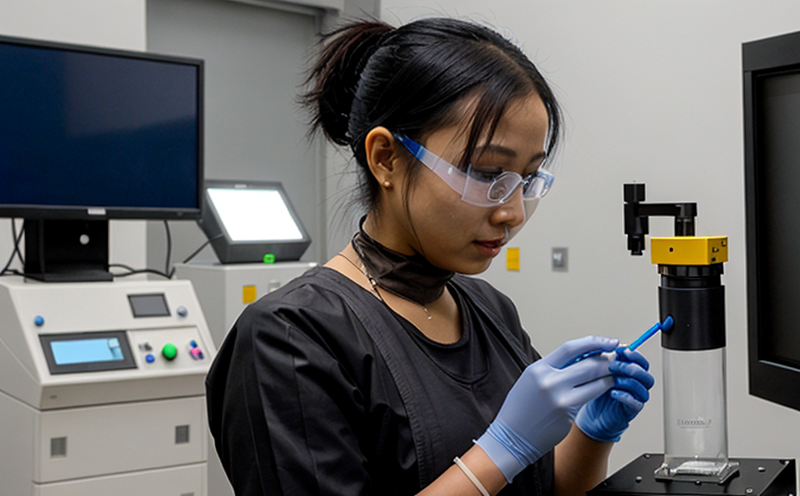OECD TG 201 Algal Growth Inhibition Test with Nanomaterials
The OECD TG 201 Algal Growth Inhibition Test is an internationally recognized method for assessing the potential environmental impact of nanomaterials. This test evaluates how nanomaterials influence algal growth, which is a crucial indicator of their ecotoxicological properties in aquatic environments.
Algae play a vital role in maintaining water quality and supporting aquatic ecosystems. They absorb nutrients and carbon dioxide through photosynthesis, thus influencing the overall health of freshwater and marine systems. Nanomaterials, especially those with novel physical or chemical properties, can potentially disrupt these processes by affecting algal growth rates.
The OECD TG 201 test is designed to measure this impact using the microscopic green algae Ceratostigmas coronarius. This species has been chosen due to its sensitivity and adaptability under various environmental conditions. The test involves exposing the algae to different concentrations of nanomaterials in controlled laboratory settings, typically over a period ranging from 24 to 96 hours.
During this exposure, the growth rate of the algal population is monitored and compared against control groups not exposed to any nanomaterials. The inhibition or stimulation of algal growth is quantified based on changes in biomass using analytical techniques such as dry weight determination, chlorophyll content measurement, or spectrophotometric analysis.
The OECD TG 201 test protocol strictly adheres to international standards, ensuring consistency and reliability across different laboratories. Compliance with these guidelines ensures that the results are comparable and valid for regulatory purposes.
Given the complexity of nanomaterials and their potential environmental impact, this test is essential for researchers, quality managers, compliance officers, and R&D engineers working in sectors involving nanotechnology. It provides critical insights into the safety profile of these materials before they enter commercial use or environmental release.
The OECD TG 201 Algal Growth Inhibition Test is not only a regulatory requirement but also an essential step in responsible product development. By understanding how nanomaterials interact with their environment, companies can design safer products and mitigate potential risks associated with unintended environmental impacts.
Eurolab Advantages
At Eurolab, we offer comprehensive support for the OECD TG 201 Algal Growth Inhibition Test, leveraging our expertise in nanotoxicology to ensure accurate and reliable test results. Our team of highly qualified scientists brings years of experience in environmental testing and regulatory compliance.
We provide advanced laboratory facilities equipped with state-of-the-art instrumentation such as flow cytometers for detailed analysis of algal cells and high-performance liquid chromatography (HPLC) systems for precise quantification of nutrient levels. These tools enable us to conduct thorough assessments that meet the stringent requirements set by international standards.
Our commitment to quality extends beyond our equipment; we follow strict protocols and adhere rigorously to OECD guidelines throughout every step of the testing process. This ensures consistency in results across multiple batches or samples, providing clients with confidence in their data.
We also offer flexible service options tailored to meet your specific needs. From single tests to ongoing monitoring programs, our experienced staff can guide you through each stage of the project and provide valuable insights into interpreting test outcomes.
Why Choose This Test
The OECD TG 201 Algal Growth Inhibition Test is chosen for its ability to predict potential environmental risks posed by nanomaterials. The test serves as a critical tool in the risk assessment framework, helping stakeholders make informed decisions about product development and regulatory compliance.
By using this method, organizations can demonstrate their commitment to sustainability and responsible innovation. It allows companies to proactively address any concerns regarding the environmental impact of their products early on in the design phase.
The test is particularly beneficial for firms involved in sectors where nanomaterials are used extensively but have limited historical data or regulatory precedents, such as electronics manufacturing, cosmetics development, and biotechnology research. It provides a standardized approach to evaluate new materials based on internationally accepted criteria.
Moreover, the OECD TG 201 Algal Growth Inhibition Test helps companies comply with various national and international regulations governing nanomaterials. Many countries have implemented laws requiring manufacturers and importers to conduct such tests as part of their environmental assessments.
Quality and Reliability Assurance
At Eurolab, we uphold the highest standards of quality assurance in all our services, including the OECD TG 201 Algal Growth Inhibition Test. Our commitment to excellence is reflected in every aspect of the testing process—from sample preparation to data analysis.
We follow a rigorous quality management system certified ISO/IEC 17025:2017 and ISO/TS 16949, ensuring that our laboratory practices meet international benchmarks. This certification guarantees clients that they are working with professionals who adhere strictly to best practices and maintain consistent accuracy in their work.
Our quality assurance measures extend beyond compliance; we continuously review and refine our methods based on feedback from both internal teams and external stakeholders. Regular staff training sessions keep everyone up-to-date with the latest developments in nanotoxicology and related fields, further enhancing the precision of our tests.
In addition to internal audits, Eurolab also welcomes external reviews conducted by accredited bodies recognized globally for their expertise in laboratory accreditation. These independent assessments provide additional layers of validation that reinforce our reputation as a trusted partner in environmental testing services.





